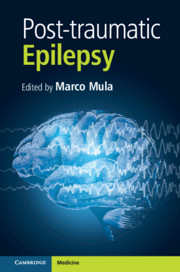Book contents
- Post-traumatic Epilepsy
- Post-traumatic Epilepsy
- Copyright page
- Contents
- Contributors
- Foreword
- Preface
- Chapter 1 Neurobiological Aspects of Post-traumatic Epilepsy: Lessons from Animal Models
- Chapter 2 Post-traumatic Epilepsy: Epidemiology, Definition and Terminology
- Chapter 3 Traumatic Brain Injury: The Acute Management and Prevention Programmes
- Chapter 4 Critical Care Management of Traumatic Brain Injury
- Chapter 5 Post-traumatic Epilepsy in Children
- Chapter 6 Sport-related Concussive Convulsions
- Chapter 7 Accidents and Injuries during Seizures
- Chapter 8 Cognitive Rehabilitation of Traumatic Brain Injury and Post-traumatic Epilepsy
- Chapter 9 Neuropsychiatric Consequences of Moderate to Severe Traumatic Brain Injury
- Chapter 10 Traumatic Brain Injury and Psychogenic Nonepileptic Seizures
- Chapter 11 Post-traumatic Epilepsy and Post-traumatic Stress Disorder
- Chapter 12 Antiepileptogenic Therapies for Post-traumatic Epilepsy: Is There Any Evidence?
- Chapter 13 Effects of Antiepileptic Drugs on Cognition
- Chapter 14 Post-traumatic Epilepsy in Low Income Countries
- Index
- References
Chapter 11 - Post-traumatic Epilepsy and Post-traumatic Stress Disorder
Published online by Cambridge University Press: 10 August 2021
- Post-traumatic Epilepsy
- Post-traumatic Epilepsy
- Copyright page
- Contents
- Contributors
- Foreword
- Preface
- Chapter 1 Neurobiological Aspects of Post-traumatic Epilepsy: Lessons from Animal Models
- Chapter 2 Post-traumatic Epilepsy: Epidemiology, Definition and Terminology
- Chapter 3 Traumatic Brain Injury: The Acute Management and Prevention Programmes
- Chapter 4 Critical Care Management of Traumatic Brain Injury
- Chapter 5 Post-traumatic Epilepsy in Children
- Chapter 6 Sport-related Concussive Convulsions
- Chapter 7 Accidents and Injuries during Seizures
- Chapter 8 Cognitive Rehabilitation of Traumatic Brain Injury and Post-traumatic Epilepsy
- Chapter 9 Neuropsychiatric Consequences of Moderate to Severe Traumatic Brain Injury
- Chapter 10 Traumatic Brain Injury and Psychogenic Nonepileptic Seizures
- Chapter 11 Post-traumatic Epilepsy and Post-traumatic Stress Disorder
- Chapter 12 Antiepileptogenic Therapies for Post-traumatic Epilepsy: Is There Any Evidence?
- Chapter 13 Effects of Antiepileptic Drugs on Cognition
- Chapter 14 Post-traumatic Epilepsy in Low Income Countries
- Index
- References
Summary
People with traumatic brain injury (TBI) can develop a variety of behavioural changes and psychiatric problems as a consequence of the TBI but the relationship with post-traumatic stress disorder (PTSD) has received increasing attention only recently.
The aim of this chapter is to discuss current literature on the relationship between PTSD and epilepsy in terms of neurobiology and clinical correlates and the potential relationship with TBI. As shown for other psychiatric disorders, people with PTSD seem to have a 3 to 6 times increased risk of developing epilepsy and this can be explained by a number of shared neurobiological mechanisms in addition to the role of brain damage when PTSD is associated with TBI. However, psychogenic-non-epileptic seizures (PNES) seem to be even more closely associated with PTSD, carrying sometimes substantial challenges in terms of differential diagnosis.
Data on treatment of PTSD are also reviewed, discussing specific issues of people with epilepsy, namely interactions and seizure risk.
- Type
- Chapter
- Information
- Post-traumatic Epilepsy , pp. 149 - 156Publisher: Cambridge University PressPrint publication year: 2021

